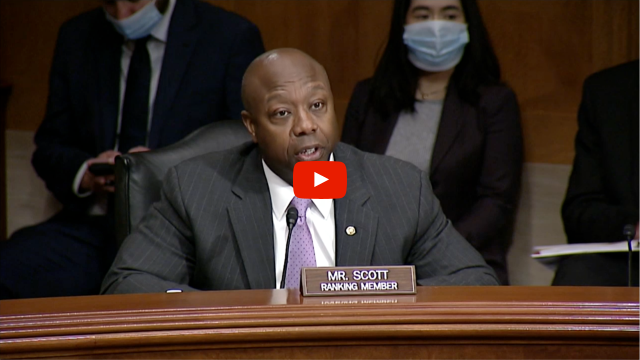Ranking Member Scott's Opening Remarks at Aging Hearing on Disaster Management
WASHINGTON – Today, U.S. Senate Special Committee on Aging Ranking Member Tim Scott (R-S.C.) delivered the following opening remarks at the committee’s hearing titled “Inclusive Disaster Management: Improving Preparedness, Response, and Recovery."
Click to watch the senator’s opening remarks
Remarks as delivered:
Thank you, Mr. Chairman, first for your leadership on this committee, and second for joining the FEED Act, a very important piece of legislation that will help us tackle the challenges of food insecurity, especially during the height of disasters.
Thank you to our witnesses for being with us today.
Older Americans and people with disabilities are more vulnerable to natural disasters, and we must do everything we can to protect them.
Mr. Chairman, I recognize how hard Hurricane Ida hit your state in September; and how Pennsylvanians responded as they always do — with courage and with strength.
In the Palmetto State, we are all too familiar with floods, hurricanes, and other natural disasters. Like so many other South Carolinians, I will never forget the 1,000-year flood in 2015. After those floods, we were hit the next year by Hurricane Matthew. We experienced tragedy and triumph.
Folks like Janice and Gene Davis, a wife and husband in Hilton Head, represent the strength of South Carolinians during a response to a natural disaster. Gene owned an auto painting business. Janice was a caregiver to Jo Scott, an 88-year-old widow. When it became unsafe for Jo to stay home, Janice and Gene drove through the storm to pick her up. With the power out, streets flooded, and trees down, they drove Jo to her son’s home in Saint Louis, Missouri — more than 800 miles away.
South Carolina has proven a leader in disaster management. The University of South Carolina’s Hazards [and] Vulnerability Research Institute developed a tool that estimated a county’s vulnerability to disaster. The tool, the Social Vulnerability Index, includes elderly persons and individuals with special needs. The index now includes all counties in the United States, and FEMA has adopted it in their National Risk Index.
The first step in effective disaster management is, of course, prevention. That is why I introduced bipartisan legislation with Senator Schatz from Hawaii, the [Repeatedly] Flooded Communities Preparation Act. This seeks to provide more resources to those areas of our nation that consistently, continuously flood — they are flood-prone communities.
The legislation would break the costly cycle of repeated flooding and rebuilding by providing our communities with the tools to take proactive steps to reduce flood risk and safeguard homes and businesses.
But even the best preparation cannot stop every disaster. Once a disaster happens, we also need solutions to assist in those communities. That’s why I introduced the [FEMA Empowering Essential Deliveries] FEED Act, with Senator Murphy from Connecticut. I’m very thankful that our chairman has joined the FEED Act.
The FEED Act would increase food security for older Americans and others during emergencies by opening up a pathway for food producers, restaurants, and non-profits to partner with their state and local governments to meet the needs on the ground. It’s through reforms like the FEED Act that we are able to assist local communities in the midst of a disaster.
Lastly, we must also continue to work to improve post-disaster recovery.
In South Carolina, as in many southern states, heirs’ property is passed down by inheritance. In the wake of disasters, FEMA regulations reflected unjust discrimination against those heirs, who are disproportionately poor and minorities because they simply can’t afford to clear the titles. These homeowners had been ruled ineligible for the disaster assistance they should receive. This resulted in FEMA denying twice as many requests for disaster aid in majority-minority counties as the national average.
In August, Senator Ossoff and I sent a letter to Homeland Security Secretary Mayorkas urging FEMA to review and revise its practices. As a result, FEMA changed its policies in September. FEMA will now accept a broader range of documentation to prove homeownership and occupancy, such as receipts for home repairs or improvements, a long overdue correction of something that’s simply not right.
I’m pleased with this progress and urge FEMA to do more to better support people in rural areas. The poorest homeowners, often in rural America, receive half what wealthier homeowners do in home repair assistance.
There is a 17-point gap between the denial of aid for higher income homeowners versus poorer homeowners, who tend to live in rural places like rural South Carolina. FEMA accepts 90 percent of disaster requests [of] $7.5 million or more, compared to just 6 percent for requests of $1.5 million or less. While damages in more urban areas often easily reach $10 million, larger amounts of damage in rural areas do not often meet that total.
I look forward to working with you, Mr. Chairman, as we look for ways to help our seniors weather the storm and be better prepared for the outcome that will be positive, especially for those who are also with special needs and disabilities.
Thank you, Mr. Chairman.
###
